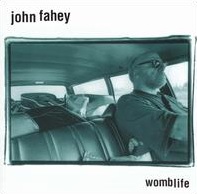History
Womblife continues John Fahey's career resurgence, again bearing minimal resemblance to his earliest work. It incorporates sound collages and experimental music.
Working with Jim O’Rourke, Fahey taped Womblife in the younger musician’s bedroom. O'Rourke has been long associated with the experimental and improv scene, frequently citing Fahey as an influence on his work. Echo, loops and samples along with guitar are used in musique concrète, a style Fahey used as far back as 1968's Requia . [1] O'Rourke plays guitar on "Juana". [2]
Reception
Womblife was one of three releases by John Fahey in 1997. All three (including the album City of Refuge and the EP The Mill Pond ) were experimental and avant-garde and were unexpected by his long-time fan base. Music critic Brian Olewnick of AllMusic highly recommended the release, writing, "This is not your father's John Fahey", and calling it "one of the more overtly experimental albums in the Fahey catalog and also one of the most fascinatingly beautiful." [3] He cited "Juana" as a more conventional track.
Richard Gehr referred to it as "echoing", an "innovative electric album". [6] Stewart Voegtlin of Stylus Magazine called it "... a complex record that marries musique concrete to bottleneck blues. It doesn’t always work: one often strains to hear the guitar over the invasive din." [7]
This page is based on this
Wikipedia article Text is available under the
CC BY-SA 4.0 license; additional terms may apply.
Images, videos and audio are available under their respective licenses.
